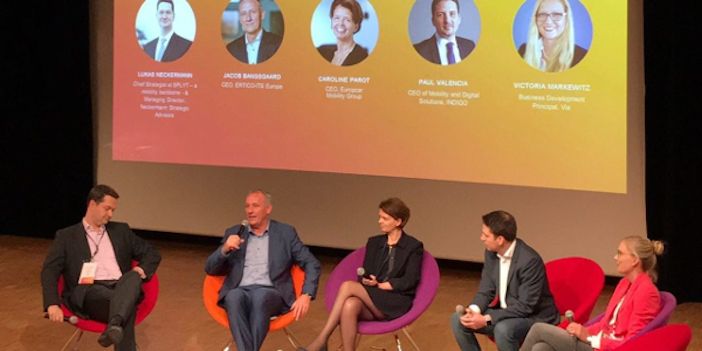ERTICO-ITS Europe has highlighted its Mobility as a Service (MaaS) initiatives at the recent Urban Mobility Summit held in Paris, France, which was attended by some of Europe’s most influential leaders, policymakers and innovators in the field of city transportation and infrastructure.
Organized by the independent French company Autonomy, the third annual event on urban mobility was attended by 10,000 visitors, 150 speakers and 200 exhibitors, with representatives from 30 countries who gathered to discuss solutions that will change the way people move around cities in the future.
The summit combines a trade show, a series of conferences and workshops, pitch sessions for 50 innovative startups, and 1,500 business networking meetings. The 2018 event focused on the five key mobility disruptors: Active mobility, Data analytics, Electric solutions, Shared mobility, and Autonomous vehicles (collectively known as ADESA).
ERTICO used the summit to present its work on urban mobility such as its MaaS initiative and to engage in a constructive exchange of views and know-how with representatives from both the private and public sectors, working together to advance smart mobility solutions for future travel options. The summit was also an opportunity for the organization to continue the work carried out with representatives of the European Institutions, such as MEP Karima Delli, with whom ERTICO will collaborate when it comes to supporting startups, which are an important piece of the smart mobility puzzle.
The event also provided an opportunity to experience the latest trends in urban mobility, especially micromobility solutions, and ERTICO partners Toyota, Qualcomm and TomTom used the opportunity to demonstrate their active involvement in providing smart mobility solutions for the future.
ERTICO’s CEO and president of the organization’s MaaS Alliance Platform, Jacob Bangsgaard, and Piia Karjalainen, ERTICO’s senior manager responsible for the Platform, spoke about the need to create and support an open ecosystem for the MaaS concept, which will allow the integration of various forms of transport into a single mobility service accessible on demand.
With almost 60 international members, the MaaS Alliance has come a long way since it was founded in 2015. A rapid evolution and increase in public interest in MaaS is the proof that end users are shifting from ownership toward access and on-demand transport services in urban transport.
“There is no winner takes it all,” said Bangsgaard (above). “It is important to strengthen the collaboration between the public and private sectors and to create coordinated activities when it comes to the development of MaaS. A successful MaaS service not only meets travelers’ mobility needs and solves the inconvenient parts of individual journeys, but also brings new business models and services to complement and integrate the existing offerings. MaaS is not so much about getting rid of the car, but more about having access to one when you need it, together with the other modes of transport.”





